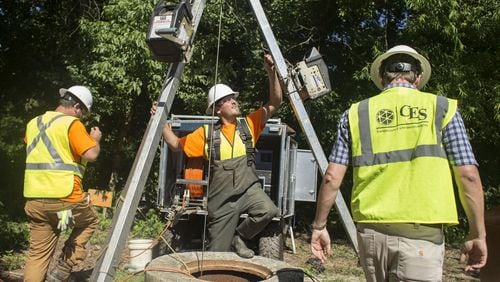Deep in dirty DeKalb County sewer pipes, rectangular robots on wheels are crawling through trash, sediment and grease to find clogs.
DeKalb County CEO Mike Thurmond said Wednesday the sewer cleaning will go a long way toward reducing pollution and increasing sewer capacity needed for business growth. It’ll also help reduce the number of sewer spills in the county.
So far, more than 80 tons of debris have been removed from sewer lines.
DeKalb's government is under a federal court order to drastically reduce sewage spills by mid-2020, though it still reports more than 100 each year that reach public waters. The spills resulted in $294,000 in fines levied against the county last week by the U.S. Environmental Protection Agency and Georgia Environmental Protection Division.
"Our quality of life, as well as future economic growth, is dependent on maintaining and repairing our sewer system," Thurmond told reporters during a demonstration of the sewer cleaning work at a manhole behind Marist School in Brookhaven. "I want our citizens and business leaders to know that we are working to address these critical issues."
Repairs to the county’s aging water and sewer infrastructure will cost DeKalb residents about $1.35 billion spread over more than a decade.
Rather than replacing every clogged sewer line, cleaning them can achieve the same result at a lower cost, Thurmond said. The county government hadn’t ordered a comprehensive cleaning of its sewer system in more than 50 years.
County contractors for Compliance Envirosystems showed their work Wednesday, climbing 18 feet down into a sewer and carrying the robot down with them.
The robot, equipped with a closed-circuit camera and sonar, then sent what it was seeing to an above-ground monitor, which displayed a fast flow of sewage and a heat map where blockages could be viewed.
At this heavily used manhole, sediment and debris wasn’t a problem, probably because the steady stream of sewage swept it away, said Von Gomel, a project manager for Compliance Envirosystems.
But that isn’t always the case. He said he’s already found many blocked pipes across the county so far, and the work will continue for another two years. Any pipe that’s more than 10 percent clogged must be cleaned, often using high-pressure water sprays to flush out stoppages.
“It will make a huge difference,” Gomel said. “Once they come in and clear out all the debris and they assess the problems, I think it will have a huge impact.”
It won’t be clear how much sewer capacity has been restored until fall, when more cleaning work will have been completed, Thurmond said.
County government officials warned several businesses last year that the sewer system may not be able to accommodate planned development, but Thurmond said he hopes potential limitations can be fixed before they hinder companies' expansion plans.
The DeKalb Board of Commissioners approved a $7.2 million contract in April for Compliance Envirosystems to inspect and clean 800,000 feet of sewer lines.
In all, the county has spent $65.8 million on improvements to the county’s sewer system based on the federal court order mandating upgrades.
About the Author







